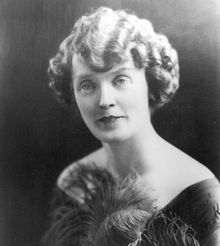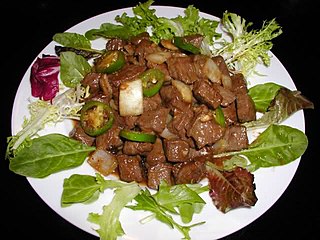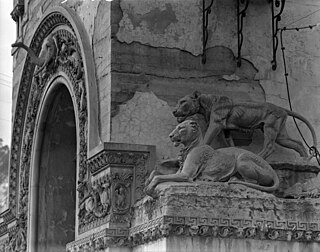
El Monte is a city in Los Angeles County, California, United States. The city lies in the San Gabriel Valley, east of the city of Los Angeles.

Rosemead is a city in Los Angeles County, California, United States. The 2020 United States Census reported a population of 51,185. Rosemead is part of a cluster of cities, along with Alhambra, Arcadia, Temple City, Monterey Park, San Marino, and San Gabriel, in the west San Gabriel Valley with a growing Asian-American population.

Mabel Stark, whose real name was Mary Ann Haynie, was a renowned tiger trainer of the 1920s. She was referred to as one of the world's first women tiger trainers/tamers. In its belated obituary, The New York Times lauded Stark as "one of the most celebrated animal trainers in a field dominated by men."

Leo the Lion is the mascot for the Hollywood film studio Metro-Goldwyn-Mayer and one of its predecessors, Goldwyn Pictures. The logo was created by artist Lionel S. Reiss, who served as art director at Paramount Pictures.

Cat meat is meat prepared from domestic cats for human consumption. Some countries serve cat meat as a regular food, whereas others have only consumed some cat meat in desperation during wartime, famine or poverty.

The Selig Zoo in Los Angeles, California was an early 20th century animal collection managed by Col. W.N. Selig for use in Selig Polyscope Company films and as a tourist attraction. Over the years the zoo was also known as the Luna Park Zoo, California Zoological Gardens, Zoopark, and, eventually, Lincoln Amusement Park. After Westerns, "animal pictures" were Selig's second-most popular genre of film product.

In Defense of Animals (IDA) is an animal protection organization founded in 1983 in San Rafael, California, United States. The group's slogan is "working to protect the rights, welfare, and habitats of animals".

The Oaklawn Farm Zoo was a zoo located in Millville, Nova Scotia, Canada, just south of the village of Aylesford. Before closing, it was Nova Scotia's largest zoo. The zoo opened in 1984, and was family-owned and operated by Ron and Gail Rogerson. The zoo boasted the largest display of Big Cats and Primates in Eastern Canada. The 50-acre (20 ha) zoo was in a rural setting in Nova Scotia's Annapolis Valley.

Al G. Barnes Circus was an American circus run by Alpheus George Barnes Stonehouse that operated from 1898 to 1938.

Jungleland USA was a private zoo, animal training facility, and animal theme park in Thousand Oaks, California, United States, on the current site of the Thousand Oaks Civic Arts Plaza. At its peak the facility encompassed 170 acres (69 ha).
Bahawalpur Zoo, established in 1942, is a 25-acre (10 ha) zoological garden in Bahawalpur, Punjab, Pakistan. It is managed by the Government of Pakistan.
The 2011 Zanesville, Ohio animal escape occurred on October 18, 2011, when the owner of Muskingum County Animal Farm released multiple exotic animals before dying by suicide. 48 animals were subsequently killed by law enforcement.

Direct Action Everywhere (DxE) is an international grassroots network of animal rights activists founded in 2013 in the San Francisco Bay Area. DxE uses disruptive protests and non-violent direct action tactics, such as open rescue of animals from factory farms. Their intent is to build a movement that can eventually shift culture and change social and political institutions. DxE activists work to "put an end to the commodity status of animals."
Animal Liberation is a nonprofit animal rights organisation based in Sydney, founded by Christine Townend and led by current CEO Lynda Stoner. It was formed in 1976, one year after the release of Animal Liberation by Australian philosopher Peter Singer. Animal Liberation's primary campaigns are to advocate against the use of animals for food, clothing, research, sport and entertainment, by promoting a vegan lifestyle.

The Gilmore Oil Company was an independent oil company in California which was founded by Arthur Fremont Gilmore after he struck oil on his dairy farm in the Fairfax district of Los Angeles around 1903. His son, Earl Bell Gilmore, took over the family business and expanded its distribution network which, at its peak, operated over three thousand gas stations on the West Coast. He increased advertising and sponsorships to promote the company.

Proposition 12 was a California ballot proposition in that state's general election on November 6, 2018. The measure was self-titled the Prevention of Cruelty to Farm Animals Act. The measure passed, by a vote of about 63% Yes to 37% No.

Four Paws is a global animal welfare organisation based in Vienna, Austria. It focuses on improving the living conditions of animals under direct human influence, by revealing suffering, rescuing animals in need, and protecting them.
"The Baby in the Icebox" is a 1932 short story by James M. Cain and the first of his many works set in California during the Great Depression.

Universal City Zoo was a private animal collection in southern California that provided animals for silent-era Universal Pictures adventure films, circus pictures, and animal comedies, and to "serve as a point of interest" for tourists visiting Universal City. The animals were also leased to other studios. The zoo was closed in 1930, after cinema's transition to synchronized sound complicated the existing systems for using trained animals onscreen.
















